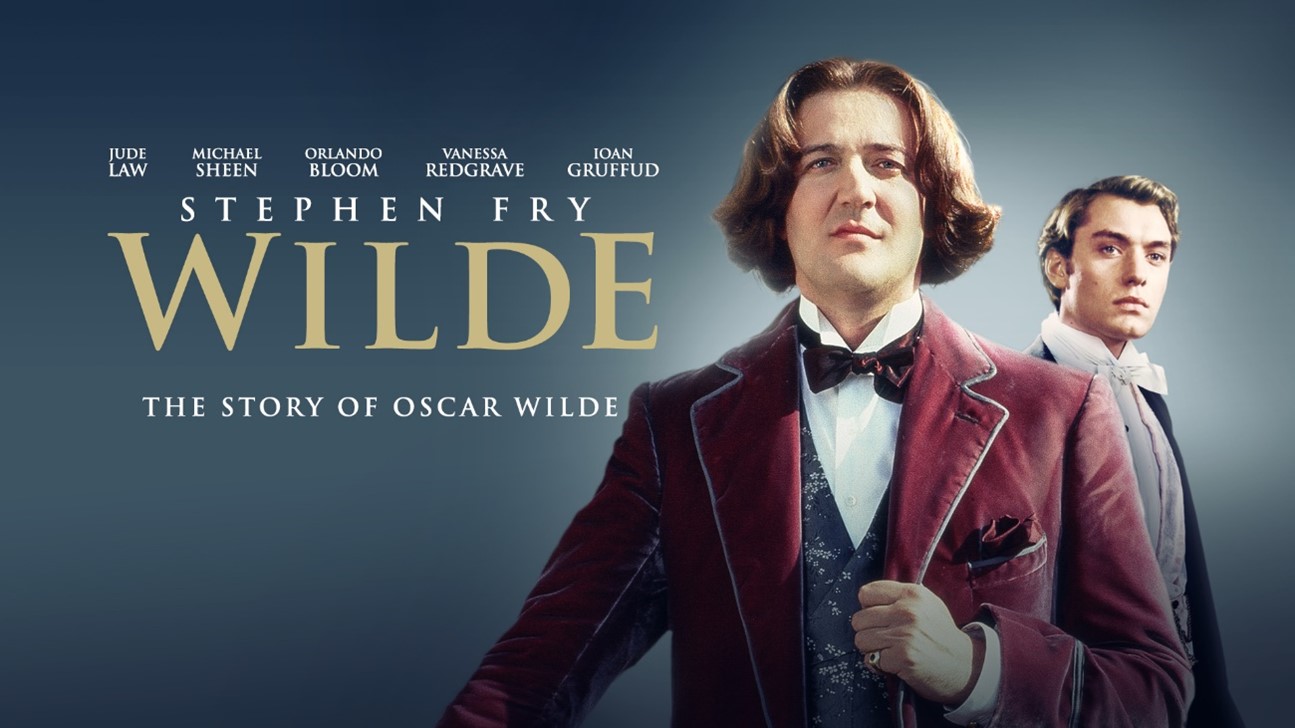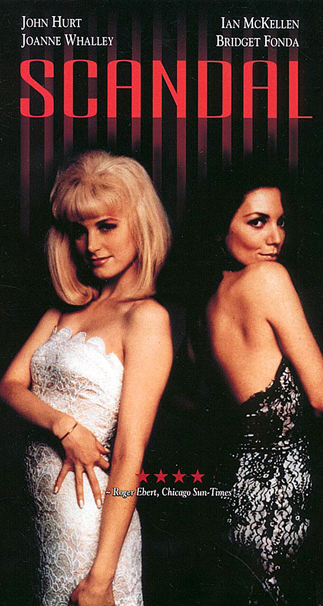“You’ve never made love, until you’ve made love in a gondola”, Scandal (1989)
That possibly caught your attention!
We’re on the topic of biographical films, or biopics. These are movies that dramatise the life of an actual person, using the central character's real name to tell part of a life that is historically important or interesting.
Biopics go right back to the beginnings of cinema, the first movie audiences being understandably fascinated with seeing historical figures, previously known just from books and paintings, brought to life.
The problem is, of course, that no biopic can cover a whole life, and so screenwriters leave parts out, rearrange events, or insert fictional or ‘composite’ characters. Accordingly, biopics are not always reliable sources of historical fact.
Also, as we are often most interested in famous people’s private lives, many of these biopics involve sexual relationships. This becomes even more interesting when events have taken place in a familiar place, such as your hometown. And so, let us look at a few big screen scandals that have connections with Torbay.
We’ll begin with the most famous impropriety of the late nineteenth century, that committed by Oscar Wilde.
In the 1997 movie ‘Wilde,’ national treasure Stephen Fry plays Oscar. Is there a physical resemblance? The age was similar. Stephen Fry was 40 at the time, while Oscar was 38 back in 1892 when he visited us.
One of the most well-known personalities of his day, Wilde stayed at Babbacombe Cliff for four weeks, having borrowed the house from Lady Mount-Temple, his wife’s distant cousin and a wealthy patron of the arts.
Here Oscar completed his plays ‘A Woman of No Importance,’ ‘Salome,’ and ‘Lady Windemere’s Fan’. After the banning of Salome, Wilde wrote to Lord Alfred (Bosie) Douglas: “It is a lovely place, it only lacks you.” Bosie then took the train down to Torquay.
Bosie was, according to Wilde, “a gay, gilt, and gracious lad. He lies like a hyacinth on the sofa, and I worship him.” In the movie, Jude Law played Oscar’s love interest.
The men looked after Wilde’s two sons, Cyril, seven, and six-year-old Vyvyan. As a game, Babbacombe Cliff was imagined as an institution “combining the advantages of a public school with those of a lunatic asylum”. Wilde was the headmaster and drew up rules. Yet, these games led to a falling out between Wilde and Bosie. After “a revolting scene”, an outraged Bosie left Babbacombe.
In April 1895, Bosie’s father, the Marquis of Queensberry, made allegations of homosexuality against Wilde. Oscar sued for libel but lost. During the trial, details of his private life were revealed, and Wilde was arrested and sentenced to two years of hard labour in Reading Gaol. Upon his release, Oscar left for France, never to return. He died destitute in Paris at the age of 46. The movie ‘Wilde, tells the story of Oscar’s downfall well.
For a long time critics saw male biopics and female biopics as distinct genres, the former generally dealing with great accomplishments, the latter portraying women as victims.
Perhaps reflecting this now hopefully outdated theme, we have 1994’s ‘Tom & Viv’.
The movie was based on the life of the American poet Thomas Stearns (TS) Eliot and his wife, Vivienne. Willem Dafoe played Tom while Miranda Richardson was Viv.
The couple met in Oxford in 1915, where Tom was studying philosophy, and were married three months later. However, Vivienne experienced long-term mental health problems, and their marriage eventually failed. It’s been suggested that their troubled relationship inspired Tom to write ‘The Waste Land,’ one of the twentieth century’s finest poems.
Tom and Viv’s marriage was also unconventional, as it may have included a ‘love triangle’ with the philosopher Bertrand Russell, some of which took place in the Bay.
Historians have been arguing about this for decades, but the evidence does suggest a close relationship between the three.
In 1915, Bertrand loaned the couple £3,000 to help the Eliots with living expenses. Bertrand also took an ailing Vivienne alone on a five-day holiday to Torquay’s Torbay Hotel.
While in town, he received a letter of gratitude from Tom: “I am sure you have done everything possible and handled her in the very best way… better than I… I often wonder how things would have turned out but for you… I believe we shall owe her life to you, even.”
After he was called back to London, Bertrand paid Tom’s train fare and hotel expenses so that Vivienne would have company: “I went first with her to Torquay, and Eliot replaced me after a few days,” wrote Russell in his autobiography.
While none of this is proof of a sexual relationship, they were certainly close friends. Bertrand also gave Vivienne gifts of cash, family jewellery, dancing lessons, and expensive clothing, including silk underwear.
The Eliots would return to Torquay on a winter holiday in 1916, and this time Vivienne’s condition seemed to have improved. Tom wrote to Bertrand: “I have felt happier, these few days, than ever in my life.”
Nevertheless, Vivienne continued to suffer from poor mental health, and the couple separated in 1933. Vivienne refused to accept that they were no longer together, and she pursued Tom for years. Virginia Woolf called Vivienne “a bag of ferrets” that Tom wore around his neck.
Vivienne was finally committed to an asylum in 1938, where she remained for 9 years until her death.
Most biopics are made about those who have died. It’s safer that way. The dead don’t sue, and it’s always a little risky making a movie about a well-loved figure who may still go on to do something that later turns public opinion.
On the other hand, some biopics are about living figures.
In 1955, Audie Murphy, one of the most decorated American soldiers in World War II, played himself in ‘To Hell And Back’. More recently we have ‘The Social Network’ (2010), about Mark Zuckerberg, and ‘Rocketman’ (2019), the life story of Elton John.
Another biopic with a local connection was 1989’s ‘Scandal’, the story of Britain’s greatest political scandal. The early-1960s series of events that became the Profumo Affair revolved around a vicar’s son from Torquay. This was Stephen Ward, played by John Hurt in the movie.
The other main character in the Profumo affair was Christine Keeler, who was still around when the film was made. Christine died in 2017.
Stephen was the son of Arthur Evelyn Ward, Canon of Rochester Cathedral. In 1920 the family moved to Torquay when Stephen’s father became Vicar of St. Matthias on Babbacombe Road.
After studying in Missouri, Stephen returned to Torquay in 1940 to set up as an osteopath. In 1944 he joined the Army and was posted to India and treated Gandhi. After the war, Stephen worked in London and had a stream of famous patients, including Winston Churchill and Ava Gardner. He was also a portrait painter and had the Duke of Edinburgh sit for him.
Yet, Stephen had a fondness for attractive young women, and, on occasion, he arranged for his female friends to meet the rich and famous.
In 1961, Stephen introduced the married cabinet minister John Profumo (played by Ian McKellen) to showgirl Christine Keeler (Joanne Whalley) at a party held at Lord Astor’s country home, Cliveden. The British public was fascinated by the intrigue that involved young women, politicians, and a Soviet naval attaché.
Following the scandal, Stephen was charged with living off ‘immoral earnings.’ Tragically, he committed suicide by overdosing on sleeping tablets on the last day of his trial.
As a reminder of Stephen’s role, we have the film’s theme song, ‘Nothing has been proved,’ performed by Dusty Springfield & the Pet Shop Boys, which became a Top 20 hit in 1989.


